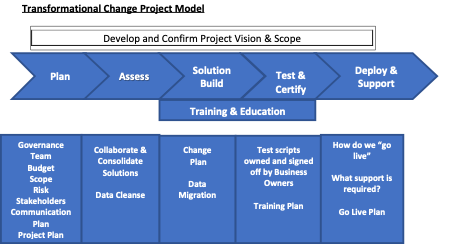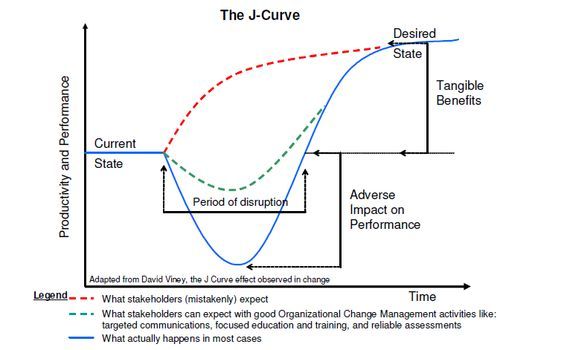Why do so many businesses fail to realise the benefits of ERP transformational projects?
Why do so many businesses fail to realise the benefits of ERP transformational projects?

4 . Lack of Change and Transformational Expertise
The acceptance by executive leadership that organisational change management will be required in the adoption of ERP technology programmes will certainty enable success. Organisations which simply view change management as an end user training exercise will experience substantial change resistance and significant periodsof disruption in their day to day operations.
However, those organisations who engage transformational change experts with the required skill set to complete organisational assessments, engage with employees using two-way communication techniques and developed customised training programmes will experience a limited period of operational disruption. Such experts who are empathic leaders are able to engage with employees resulting in them buying into the transformational programme. Such an approach will lead to the successful adoption of the ERP technology and the avoidance of deep-rooted resistance to change by the organisation’s employees and stakeholders which is demonstrated by the J Curve (see below). These forward-thinking organisations will see the performance benefits and enhanced productivity associated with successful adoption of transformational change programmes.
5. Hiring Inexperienced Resources
We already identified that inexperienced change programme leaders will simply heighten the risk of unsuccessful adoption. Interim professional change transformational experts are ideally placed to support organisation's to adopt and implement new ERP technology. Such leaders thrive on the change agenda and they are able to engage with the organisations employees as they have the experience, gravitas and emphatic leadership skills to guide the organisation through the process. The advantage of utilising interim talent is that an organisation can secure such expertise without increasing their fixed overheads.
Benefits & Conclusion
So, now that you engaged with an interim change expert to support you on your transformational journey you can expect the see a number of commercial benefits including;
- A upturn in service levels as availability of core product and on time in full delivery performance is increased
- Reduced stock holdings
- Lead times shortened
- Net positive cash flow is experienced due to a reduction in overall inventory.
- An upturn in customer service levels enables competitive advantage to be achieved, resulting in subsequent top line growth being achieved.
Whilst the majority of ERP transformational change projects fail to meet the business objectives, this can be mitigated through the engagement of interim professionals who are experts in leading transformational change projects utilising robust project management methodology. If the organisations leadership understand that the project is more than simply a technology upgrade, then they can have the reassurance of being able to realise the associated benefits of successful ERP transformation within their own businesses.
Bio
Dominic Proctor is the Managing Director of Matrix which provide Interim Management or Consultancy project support for Industrial Manufacturing, Logistics and FM organisations looking to achieve breakthrough growth for their businesses through the development of Operational Excellence model which delivers transformational change. Dominic has 30 years of supply chain and operational leadership experience in Industrial Manufacturing (Berendsen & Johnson Service Group), Logistics Distribution (Bunzl, Rexel and Big Home Shop) and Facilities Management (G4S and OCS). He is passionate about supporting organisations to achieve Supply Chain Excellence and transformational change which is achieved through a collaborative leadership style and a continual pursuit to achieve excellence. An extensive library of transformational change case studies are available to view at www.matrix.org.uk/blog
If you like to discuss a potential Transformational Change project or Operational Efficiency Improvement project, then you can contact Dominic for an informal discussion at dominic.proctor@matrix.org.uk


